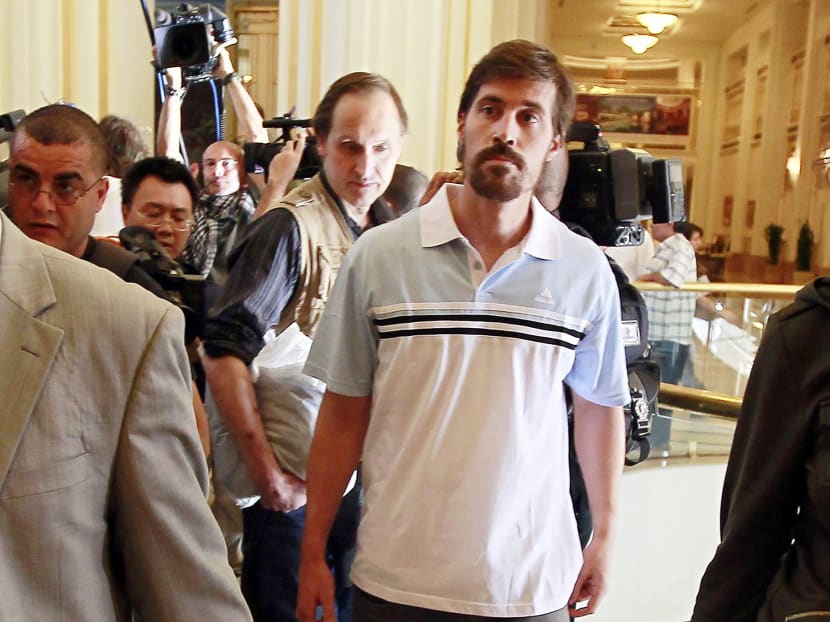US refused to pay militants for release of journalist
WASHINGTON — American journalist James Foley lost his life this week at the hands of the Islamic State. Before pulling out the knife used to decapitate him, his masked executioner explained that he was killing the 40-year-old in retaliation for the recent air strikes by the United States against the terror group in Iraq.
WASHINGTON — American journalist James Foley lost his life this week at the hands of the Islamic State. Before pulling out the knife used to decapitate him, his masked executioner explained that he was killing the 40-year-old in retaliation for the recent air strikes by the United States against the terror group in Iraq.
In fact, until recently, the Islamic State had pressed the US for a US$100 million (S$125 million) ransom,said a representative of the family and a former hostage held alongside him. The US — unlike several European countries that have funnelled millions to the group to spare the lives of their citizens — refused to pay.
The Islamic State has threatened to kill at least three other Americans it is holding if its demands remain unmet, The New York Times has confirmed through interviews with recently released prisoners, family members of the victims and mediators attempting to win their freedom.
Sensitive to growing criticism that he had not done enough, President Barack Obama said the US would not retreat until it has eliminated the “cancer” of the Islamic State from the Middle East. “The United States of America will continue to do what we must do to protect our people,” he said. “We will be vigilant and we will be relentless.”
The White House also revealed on Wednesday that a US special forces team tried and failed to rescue Mr Foley and the other American hostages during a secret mission this summer. Backed up by helicopters and planes, the soldiers had dropped into the target zone in Syria and engaged in a firefight with Islamic State militants, only to discover the hostages were not there. Several militants were killed in what appeared to be the first direct ground engagement between the US and Islamic State fighters.
Mr Obama’s top counterterrorism aide Lisa Monaco said in a statement that the President had authorised the mission because it was his national security team’s assessment that the hostages were in danger with each passing day.
Syria’s government yesterday denied that any such operation had taken place in its territory, though it does not control large areas where the Islamic State operates.
Along with the three Americans, the Islamic State is holding citizens of Britain which, like the US, has declined to pay ransoms, former hostages have said. The group has sent a laundry list of demands for the release of the hostages, starting with money but also prisoner swaps. The policy of not making concessions to terrorists and not paying ransom has put the US and Britain at odds with other European allies, who have paid significant sums to win the release of their nationals.
Kidnapping Europeans has become the main source of revenue for Al Qaeda and its affiliates, which have earned at least US$125 million in ransom payments in the past five years, an investigation by The New York Times showed.
While government and counterterrorism officials insist that paying ransoms only perpetuates the problem, the policy has meant that captured Americans have little chance of being released. A handful have succeeded in running away, and even fewer have been rescued in special operations. The rest are either held indefinitely — or killed.
When he was executed this week, Mr Foley became the second Western reporter to be killed by Islamic extremists since 2002, when Wall Street Journal reporter Daniel Pearl was beheaded by a top Al Qaeda operative.
Since then, the terror network has turned to abducting Westerners to finance itself, seizing more than 50 foreigners in the past five years, almost all of whom were released after their governments paid sizable ransoms, a review of the known cases by The New York Times showed.
The graphic video of the beheading of freelance journalist Foley may increase the pressure on Mr Obama to take more aggressive action against the Islamic State, even though his options have become more complicated.
Politically, Mr Obama has boxed himself into a corner, vowing to maintain a limited military offensive while calling the Islamic State a major threat to the region and ultimately the world, said Mr Douglas Ollivant, former Iraq director on the National Security Council for the Obama and George W Bush administrations.
“Obama was elected to get us out of Iraq and make sure there were no terrorist safe havens,” Mr Ollivant said. “Now, we’ve got a terrorist safe haven in Iraq, so what’s the guy supposed to do?” AGENCIES







